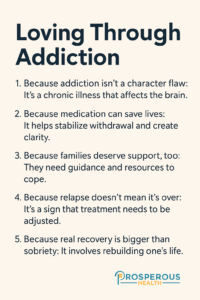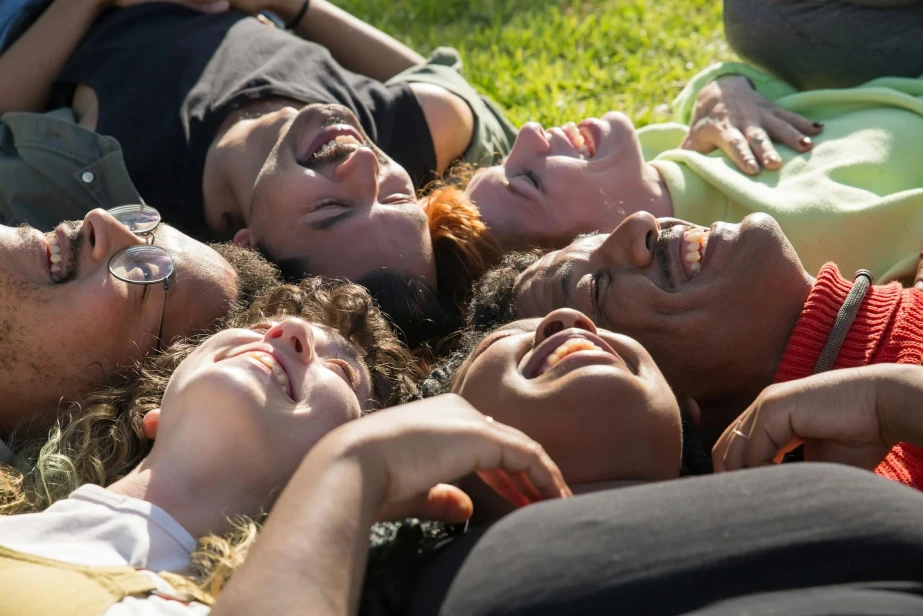When You Love Someone Who’s Struggling
Loving someone with opioid addiction is like living in two realities at once. One is filled with hope, memories, and glimpses of the person you know is still there. The other is heavy with chaos, fear, and the kind of exhaustion that only comes from loving someone in active use.
You’ve probably heard the advice: “They just need to want it.” “You can’t help someone who won’t help themselves.” “They have to hit bottom.”
But what if that framework is wrong?
At Prosperous Health, we believe opioid addiction is a chronic illness—not a personal failure. That one distinction changes how we treat your partner. And it changes what’s possible for your future.
Here’s why this belief matters.
1. Because Addiction Isn’t a Character Flaw
Opioid addiction affects the brain—its reward system, impulse control, and ability to weigh consequences. These are physical, chemical changes that can’t be reversed with willpower alone.
When treatment views addiction as a moral problem, it turns care into punishment. It pushes people away just when they need structure and compassion the most.
We treat addiction like other chronic illnesses: with medical care, personalized support, and long-term strategies. No lectures. No shame. Just real, respectful treatment.
2. Because Medication Can Save Lives
Some partners feel uneasy when they hear about medication-assisted treatment (MAT). Maybe it feels like a shortcut. Maybe it sounds like trading one drug for another.
We understand the hesitation. But here’s the truth: medications like buprenorphine and naltrexone don’t get people high. They help stabilize cravings and withdrawal so your loved one can focus on healing.
At Prosperous Health, we use medication as a bridge, not a crutch. Combined with therapy, peer support, and lifestyle changes, MAT creates the foundation for a stronger recovery. It’s not about numbing out—it’s about staying alive and staying present.
3. Because Families Deserve Support, Too
You’ve been carrying more than you were ever meant to. Monitoring behavior. Covering up. Managing crises. Trying to “be strong” when inside, you’re breaking.
We see that. And we believe you deserve care, too.
At Prosperous Health, we offer:
- Family education so you can understand what’s happening neurologically and emotionally
- Guidance on setting boundaries that don’t sever connection
- Referrals to therapists and groups who support spouses and partners
You’re not just part of the story—you’re part of the healing process. We make space for that.

4. Because Relapse Doesn’t Mean It’s Over
It’s devastating to watch someone relapse—especially when it feels like they were finally doing better. You might wonder if you can keep going. You might wonder if they even care.
But relapse is not proof that treatment didn’t work. It’s proof that recovery is a process.
We treat relapse as a moment to adjust the plan—not end the journey. That might mean more support, a different therapy approach, or longer care. We don’t shame clients or discharge them for struggling. We help them get back on their feet—and we walk with families through that, too.
5. Because Real Recovery Is Bigger Than Sobriety
We’re not in the business of quick fixes. We’re in the business of helping people rebuild.
That means treatment doesn’t end when the detox symptoms do. Our opioid addiction treatment includes:
- Individual and group therapy
- Medication support when appropriate
- Life skills coaching
- Career and education planning
- Long-term aftercare coordination
Your loved one won’t leave us with just good intentions. They’ll leave with a plan that honors their reality—and yours.
What We Offer You—and Your Partner
If you’re still standing beside your loved one, you’re already doing something extraordinary. But you shouldn’t have to do it alone.
At Prosperous Health in Southern California, we meet addiction with medical care, emotional honesty, and long-term planning. We don’t promise perfection. But we do promise partnership, structure, and a philosophy rooted in real healing—not shame.
Frequently Asked Questions
Q: Will my partner be judged or kicked out if they relapse?
A: No. We expect setbacks and support clients through them. Relapse is a signal—not a failure.
Q: I’m afraid to enable them. How do I support without losing myself?
A: We help partners create healthy boundaries that allow support without self-sacrifice. You can love someone and still protect your peace.
Q: What if my partner doesn’t want help yet?
A: You can still reach out. We can walk you through intervention options, supportive language, and ways to hold space without burning out.
Q: How involved can I be in their care?
A: With their consent, you can be part of education sessions, planning, and progress reviews. We believe family involvement—done right—improves outcomes.
Q: How long is treatment?
A: It varies. Some start with 30 days of residential care, others with outpatient. We customize plans based on needs, responsibilities, and goals.
You’re Not Alone—And You’re Not Powerless
You didn’t cause this. You can’t control it. But you can choose a treatment path that sees your partner clearly—and supports you in the process.
We treat opioid addiction like the complex illness it is. And we treat partners like the courageous, compassionate people you are.
Call (888) 308‑4057 or visit our opioid treatment program page. We’re here when you’re ready.

